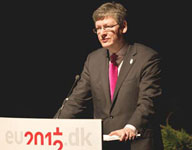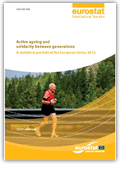 |
|
 |
|
 |
European Year... 2012"… aims to foster the conditions that make for a better future for both young and old in our ageing societies. The key lies in ensuring that people can continue to contribute to the economy and to society and to look after themselves as they grow old." László Andor |
|||||||||||||
National EventsThe European Year for Active Ageing and Solidarity between Generations 2012 was officially launched on 16th January in Denmark. This opening conference was followed by national launch conferences that have taken place in all European Member States as well as in Iceland and Norway. Most of these events were attended by one or several ministers. The events have been a complete success with a combined participation of over 4,500 people including from policy makers, stakeholder representatives, researchers and senior citizens. The President of Austria, Mr. Heinz Fischer, stressed that "the principle that you can recognise the quality of a society by the way it is treating its weakest members also applies to the generation issue. We need a mutual understanding, a strong cooperation and the willingness and curiosity to learn from each other". The President of Ireland, Michael D. Higgins, declared: "If ageing is to be a positive experience it must be accompanied by opportunities to realise the potential of all people and to participate in all facets of society. This is the essence of active ageing". All the events stressed the importance of the three main themes of the European Year, which are employment, social participation and independent living. Many of them expanded on these themes to look at more specific topics such as pensions, social isolation, senior citizen's associations, relaying information to employers on the issues of healthy living and even defining the term "older person". László Andor, the Commissioner for Employment, Social Affairs and Inclusion, or other representatives of the European Commission have been present at all of the national opening events. Commissioner Andor emphasised that "we don't have to fear population ageing if we succeed in ensuring a better health status of older people, creating more opportunities for older workers, allowing older people to remain active members in society and create an age-friendly environment where growing old need not mean to become dependent on others". Some launch events concentrated on specific national issues. Totyu Mladenov, the Bulgarian Minister of Labour and Social Policy introduced the measures and policies implemented by his office in support of active ageing: promoting working longer, creating opportunities for learning and training, development of long term care services and promotion of voluntary activity. The opening conferences have demonstrated the timeliness of the European Year 2012, proved a strong mobilisation of a wide range of stakeholders and showcased numerous new initiatives for promoting active ageing and strengthening solidarity between generations. |
||||||||||||||
National Work ProgrammesThe decision on the European Year 2012 invited participating countries to present a work programme to the Commission outlining the activities planned. So far 23 Member States have prepared their work programmes. The work programmes are available in the national language and English on the European Year 2012 website and can be seen here The national work programmes present information on how a country is promoting active ageing through its policies and on the activities planned in view of the European Year 2012. The activities range from legislative reforms over research projects and awareness campaigns to the organisation of different kind of events. A number of Member States have already decided to launch important national initiatives related to active ageing in view of EY2012 or during EY2012:
|
||||||||||||||
Media conference "Reporting on ageing and solidarity between generations"Changing the image of older people is one of the key aspects of European Year 2012. In this context the European Commission organised a media conference on 19th and 20th March in Brussels. The conference provided an opportunity for journalists to exchange views on how they cover issues related to active ageing and solidarity between generations in the media. The conference agenda included presentations on demographic developments in Europe as well as parallel workshops with high-level experts covering topics such as work and pensions, dependency and care, politics and society as well as science, technology and innovation. László Andro, EU Commissioner for Employment, Social Affairs and Inclusion, participated in the event during a questions&answers session. Around 80 journalists and experts from 22 Member States as well as representatives of the European Commission participated in this event. |
||||||||||||||

|
ESTAT brochure on facts and figures related to active ageingAs part of the dissemination effort of EY2012, the Eurostat, the statistical office of the European Union, has issued a statistical portrait of the EU 2012. The Active Ageing and Solidarity between Generations book contains statistics on topics such as demography, healthcare, pensions, volunteering and adult learning. It is available in English, French and German and can be ordered here. |
|||||||||||||
Generations@schoolSince 2009, civil society organisations have been celebrating a European Day of Solidarity between Generations on 29th April. The European Day provides an opportunity to organise activities to help foster a better understanding between young and older people and to provide opportunities for the two groups to come together to exchange their experiences and skills. The European Day of Solidarity between Generations has a special significance in 2012, which is the European Year for Active Ageing and Solidarity between Generations. Commissioners Androulla Vassiliou, in charge of education, culture, multilingualism and youth, and László Andor, in charge of employment, social affairs and inclusion, are encouraging schools all over Europe to organise a generations@school day around the 29th April by inviting older people into the classrooms and organising joint activities. Commissioner László Andor explained the purpose of the project: "With the European Year for Active Ageing and Solidarity between Generations 2012, we want to highlight the important contribution that older people make to society. The generations@school day will be a big success if schools can find new ways of bringing the older generation's experience to the benefit of their pupils. I hope that there will be many creative initiatives and that some will result in lasting forms of cooperation between the generations." The idea is to bring older people into the classrooms, to explore with the pupils how a better society for old and young can be built. Pupils can listen to the stories of the older people, and the older people to the dreams and fears of the younger. Let them reflect on what they could learn from each other and on what they could do together for a better future! The generations@school initiative is supported by many national education ministries and the European Commission's Representations in Member States. Several national ministers will be visiting a school. Miklós Réthelyi, Minister of National Resources of Hungary, visited the Janus Pannonius High School in Pécs on 2nd May. The dialogue between generations took place in the meeting of Generations@school on 23rd April in Warsaw, Poland, that was attended by the Minister of Education Krystyna Szumilas, and Wladyslaw Kosiniak-Kamysz, Minister of Labour and Social Policy, as well as other well-known senior citizens. Jan Dobes, Czech Republic State of Secretary from the Ministry of Social Affairs visited a school on 3rd May Andrea Riccardi, Italian Minister for International Cooperation will participate in activities with children at the school he attended as a child, Liceo Classico Virgilio, in Rome on 11th May. Ilze Viņķele, the Latvian Minister of welfare, will be present at a school in Sigulda on 10th May whereas Heinz K. Becker MEP will be visiting a school in Austria. A number of national ambassadors of the European Year 2012 will also take part in the project.
For further information on the European Year, visit http://www.historypin.com/gats/en/ |
||||||||||||||
CommitmentsWhat the Commission hopes to achieve during this European Year is to ensure that all players commit themselves to specific actions and goals during 2012, so that older people's opportunities improve tangibly and they can start making a greater contribution to society during the Year itself. A commitment can take many forms, and every commitment counts. It may involve policymakers implementing legislation, for instance against age discrimination or to strengthen the incentives for active ageing in social protection and tax systems. It may take the form of closer cooperation between different levels of government or different government departments whose actions are mutually reinforcing. It may imply new collective bargaining processes to improve working conditions and working time arrangements for older workers. The European Year should really be about taking action and making change happen so that we can build a more inclusive society for people of all ages. This won't happen by decree. It requires a sustained collaborative effort in which many have to play their part. The European Year should be an opportunity for citizen, employers and elected representatives – to think about what they can do in their specific roles to promote active ageing and strengthen solidarity between generations. It is an invitation to all to commit to specific actions that will contribute to these goals. Every commitment counts. Any individual, any public or private body, company, association or municipality, large or small, can set and reach attainable goals to promote a more active role for senior citizens: from policy makers implementing legislation or comprehensive action programmes to companies improving workplace facilities and working hours. The possibilities are endless – and so are the needs for improvement! The website for the European Year 2012 is the place where all those commitments can be brought together and presented to interested people across the EU and outside. Examples of commitments: Age Management at company level Active Ageing Programme in Córdoba Intergenerational Housing: Seniors and Students Sharing the Same Home Get Involved and let Europe know your commitment to the European Year 2012-03-26 |
||||||||||||||
|
||||||||||||||
| To unsubscribe click here |